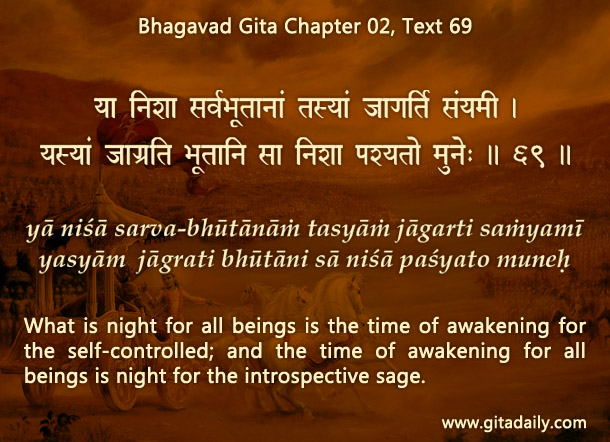 While this verse (02.69) primarily points to the difference between spiritualists and materialists, it can also apply to a specific category of spiritualists — devotees — and specifically to the difference between transcendentalists and theists.
While this verse (02.69) primarily points to the difference between spiritualists and materialists, it can also apply to a specific category of spiritualists — devotees — and specifically to the difference between transcendentalists and theists.
Theism in the sense of belief in God and even deference to God through worship is fairly widespread in human society, extending across both geography and history. But devotion in the sense of making God the focus and purpose of one’s life is rare even among theists — most theists don’t dwell too much on transcendence. They consider a modicum of religious practice as a desirable or even essential part of life. Yet they disapprove of devotion that centers one’s entire life on God; they deem it premature, excessive or impractical.
Ritual theists see God more as a fulfiller of desire, whereas dedicated transcendentalists see him as the fulfillment of desire (07.19). Such a relationship with God, wherein he becomes our life’s be-all and end-all, is so extraordinary that it may be attained even by theists only after several lifetimes of spiritual evolution. Given that theists believe in God, they usually acknowledge the validity, even the glory, of being totally devoted to God. But they prefer that such a saint emerge among someone else’s family or social circle, not theirs.
To not just respect God for what he does for us but to adore him for who he is — such a giving of one’s heart to divine love is rare indeed. Even among religious cultures, such saintly people have had to face opposition from the very people who would later, maybe years or decades or centuries later, revere them. If we are to persist in our pursuit of wholehearted devotion, we need to seek God’s pleasure even if it costs us the world’s approval, including even the religious world’s approval.
One-sentence summary:
If we seek to become dedicated transcendentalists, we need to be ready to endure the disapproval of not just of worldly people, but even ritual theists.
Think it over:
- How do theists and transcendentalists differ in their conception of God?
- How do theists and transcendentalists differ in their conception of devotion to God?
- How can theists become transcendentalists?
***
02.69: What is night for all beings is the time of awakening for the self-controlled; and the time of awakening for all beings is night for the introspective sage.
To know more about this verse, please click on the image


Hare Krishna Prabhuji,
PAMHO.
I am really grateful to you for these articles from the core of my heart. Your multi level deeper analysis of the 2nd chapter which is meant for Analysis (Sankhya Yoga) is indeed FEAST for Analyst, which offers Intellectual fullfilment but more importantly Emotional fullfilment for the heart inspiring us to perform conscious, responsible and nourishing spiritual practices which will be pleasing to Krishna.
Graphics are really making difference, just remembering them throughout the day gives access to your entire article.
Thank you so much Prabhuji
Thanks, Sanatana Goswami P, for your thoughtful and heartful appreciation; good to know that the graphics are aiding not just in comprehension, but also in recollection.
Hare Krishna prabhuji, PAMHO.
Wow am really amazed to see this devotinal level Perspektive in this Verse 2.69 , never thought of this Verse from this angel .
Thanks, happy to be of service.